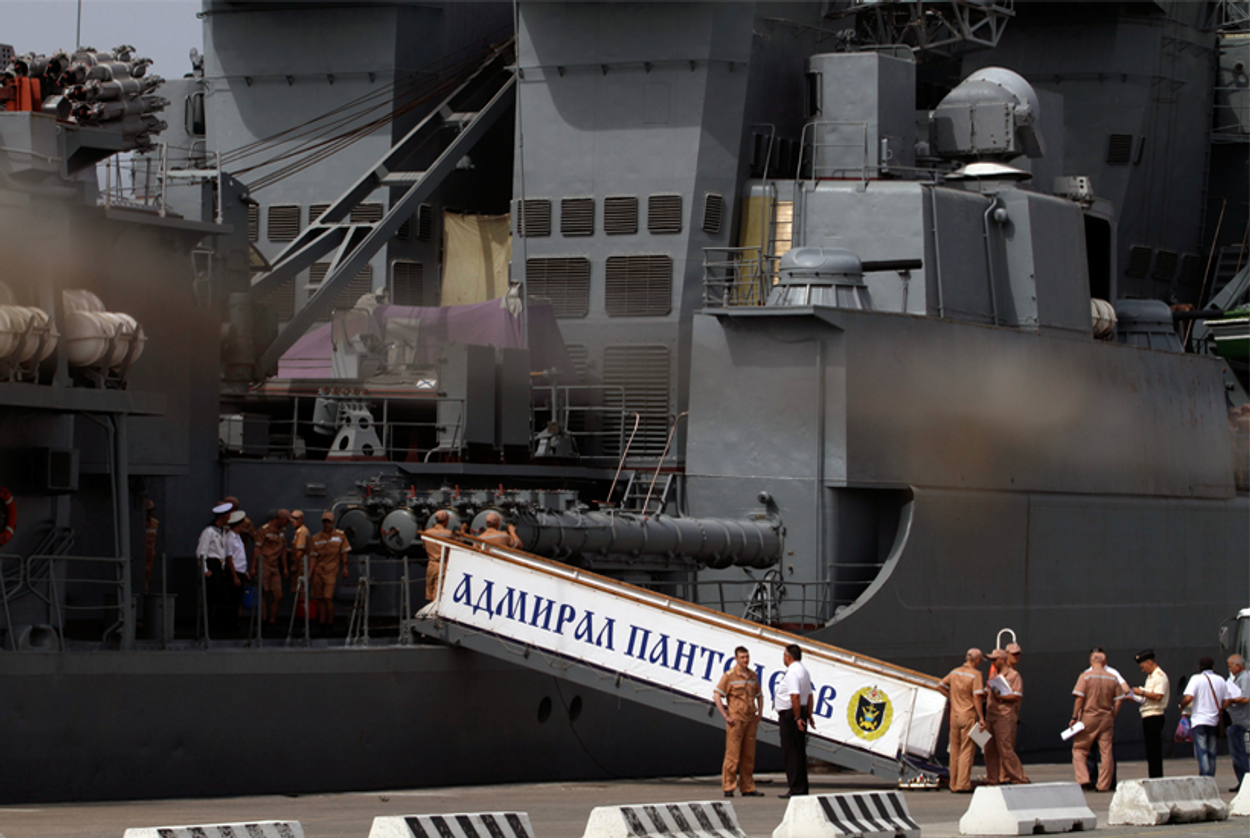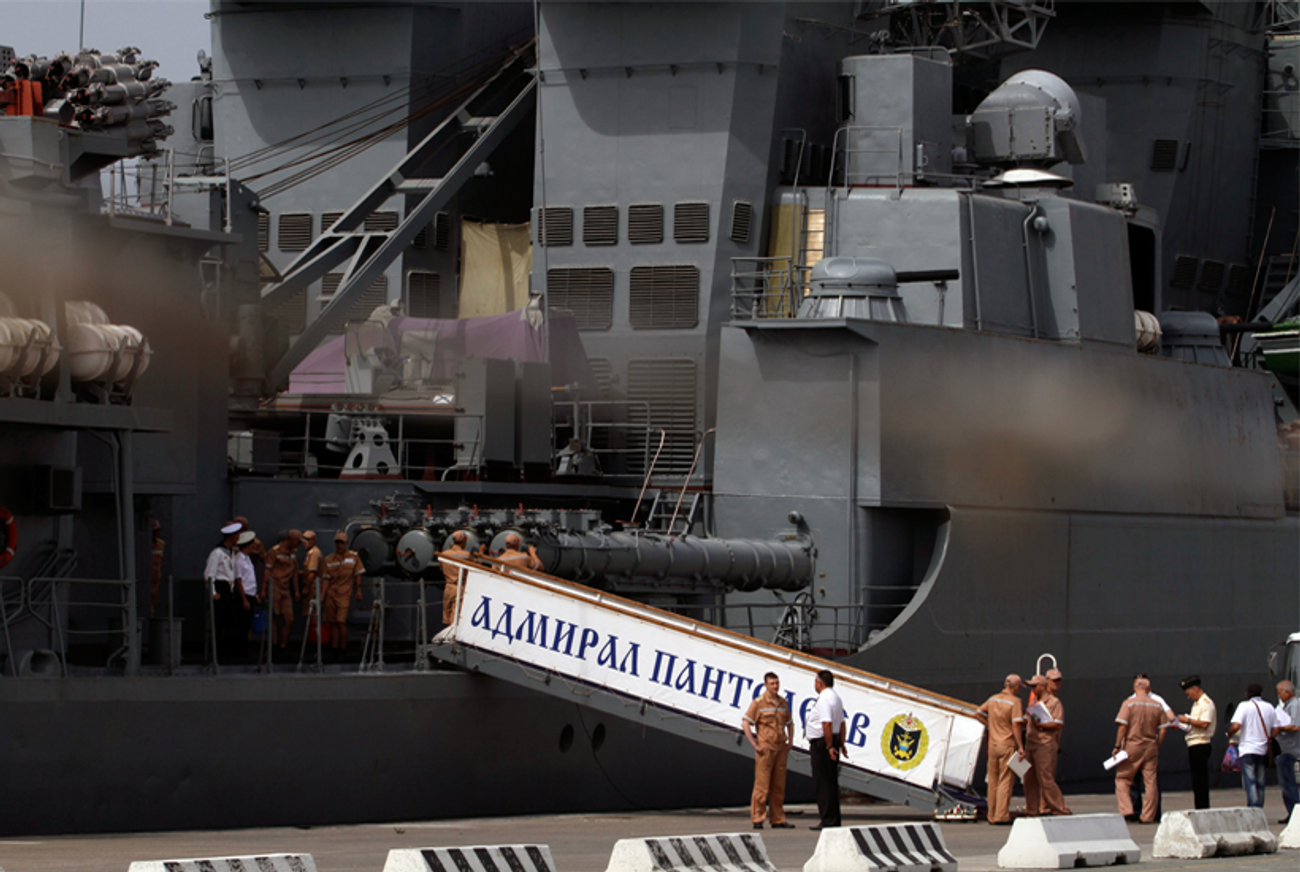While West Focuses on Crimea, Russia Continues To Make Trouble in the Middle East
The Kremlin’s interests in the region are deep—and it may see an opportunity to gain leverage in the current crisis




Until February, when pro-European protesters who spent all winter occupying Independence Square in central Kiev succeeded in bringing down the Russian-backed government of Ukraine, the biggest standoff between Moscow and the West was in the Middle East—specifically in Syria, where President Bashar al-Assad, with support from Russian President Vladimir Putin, is embroiled in a brutal four-year civil war.
But while Washington’s policymakers are focusing on Putin’s actions in Eastern Europe, events in the eastern Mediterranean continue to unfold with their own momentum—and it’s highly unlikely that the Kremlin, however preoccupied it is with managing the situation in Crimea, will let its other geo-strategic priorities drop. Russian interests in the Middle East are both wide and deep—as deep as, and perhaps deeper than, the West’s—and in extremis, it’s even possible that Putin may decide to use Russia’s influence and relationships in the Middle East to severely damage Western interests there in order to gain leverage in Ukraine.
Historically, Syria was the main venue through which the Soviets projected power in the Middle East, and a number of military, political, and economic factors ensure the Kremlin’s continued hand in events there. For starters, Russia maintains a naval base in the coastal Syrian city of Tartus—Russia’s only port in the Mediterranean and a crucial sea link given that access to and from the Black Sea is controlled by Turkey, a NATO-member country. Last May, the Russian navy established what was described as a permanent Mediterranean naval task force, part of Putin’s project of reinvigorating the Russian military and projecting power globally. Without access to Tartus, Russian ships and submarines would have nowhere in the eastern Mediterranean to refuel.
Russia also has a deep fear of Islamic—and specifically Sunni—fundamentalism and has engaged in what it perceives as its own long-running battle against Islamic radicalism, first in Afghanistan and for the last 15 years in the Caucasus. In Syria, where a post-Assad regime would likely be dominated by hard-line Sunni Islamists, Putin genuinely fears that loss of Syria to an Islamist government will result in some kind of blowback on Russia’s southern fringe. Already Moscow knows there are a considerable number of Chechens fighting with al-Qaida-linked jihadist groups against the Assad regime, and the Russians are naturally concerned about these individuals returning to Russia if Assad is overthrown.
The Russians also have deep economic interests in Syria. The total value of Syrian contracts with the Russian defense industry likely exceeds $4 billion. And the recent discovery of natural-gas fields in the eastern Mediterranean provides a new potential revenue stream for Russia, whose state-owned natural-gas firm Soyuzneftegaz signed a contract with the Assad regime in December to explore offshore drilling opportunities in Syrian waters.
Russia’s influence over Assad is substantial—the Syrian regime is virtually a client-state of Moscow’s—and without the support of Russia the Assad regime’s survival would be in great doubt. The Russians have been both a major arms conduit for the Assad regime and have also supplied Syria with crucial political support at the United Nations, where they have vetoed a number of anti-Assad resolutions. While Russia has so far publicly encouraged both sides in the Syrian conflict to reach some kind of peaceful resolution, Putin is in a position to leverage his relationship with Assad to create headaches for the West—providing him with more advanced weaponry, or even inserting Russian military advisers to support the Assad regime. Such actions would only embolden Assad and could easily result in an even greater increase in chaos and bloodshed in Syria, with potential spillover into Turkey, Lebanon, and Jordan.
Meanwhile, Russia maintains a complex relationship with its other longtime ally in the region, Iran. Historically, first under the tsars and then under the Soviets, Tehran feared Russian expansionism. With the break-up of the Soviet Union, however, relations improved greatly, as Russian and Iranian interests began to substantially converge—particularly when it came to limiting American influence and power in the Middle East, Central Asia, and the Caucasus. Both Russia and Iran remain major backers of the Assad regime, in part because of their shared interest in opposing Sunni fundamentalism.
Unlike with Syria, however, Iran is not a client state of Russia, and there are a number of areas where Russian and Iranian interests are in conflict with each other. Economically, Russia has benefited tremendously from the international boycott against Iran. Tension in the Persian Gulf and Iran’s difficulty selling its oil in international markets has supported the high price of this commodity, which is critical for a Russian economy heavily based on its oil and gas resources. Sanctions against Iran also have prevented Central Asian states such as Kazakhstan and Turkmenistan from constructing export pipelines for their oil and gas through Iran to the Persian Gulf, allowing Russia to continue to exert a substantial influence over these countries by retaining a stranglehold on their oil- and gas-export routes.
Russia also, it should be emphasized, does not wish for Iran to obtain nuclear weapons. While the Russians remain strongly opposed to a Western or Israeli attack on Iran—believing it would be a “catastrophe” that would inflame sectarian tensions in the Middle East—the Kremlin has no interest in welcoming another nuclear power in its neighborhood, especially one that could compete with Russian influence in the Muslim states of the former Soviet Union. Putin is well aware that if Iran goes nuclear, Saudi Arabia—which in Moscow’s view is responsible for fomenting unrest in the Caucasus—might also choose to go nuclear via its alliance with Pakistan. Accordingly, while the Russians have resisted all U.N. sanctions against Syria, they have actually voted in favor of U.N. resolutions condemning Iran’s nuclear-enrichment program.
The Russians could easily leverage their relationship with Iran in a number of ways—starting by reactivating the deal to supply Iran with the S-300 missiles. Indeed, Putin may already be signaling Russia’s capabilities to retaliate against Western sanctions with his decision to send a Russian atomic energy official to Tehran to discuss building a second nuclear plant in Iran.
In a best-case scenario—a diplomatic settlement on Ukraine—Putin could decide to increase his cooperation with the West in the Middle East. In Syria, for example, Putin could reduce or even cut off the flow of weapons to the Syrian regime; push Assad to negotiate more seriously with the moderate opposition; or make a statement of some sort indicating that Russia does not see Assad as an indispensable part of Syria’s future. On Iran, Putin could signal support for the Western position simply by ending discussions on additional nuclear energy cooperation with Tehran, as well as by publicly pushing Iran to reach a settlement freezing its nuclear program.
But now, in the wake of the Crimean referendum, we’re heading into a field of unknowns—and if Putin decides he’s willing to upend his relationship with Europe, there’s no reason to think he wouldn’t exercise his capacity to significantly damage Western interests in the Middle East if he so chooses.
***
Like this article? Sign up for our Daily Digest to get Tablet Magazine’s new content in your inbox each morning.
Josh Cohen is a former U.S. State Department official who was involved in managing economic reform projects in the former Soviet Union. His Twitter feed is @jkc_in_dc.
Josh Cohen is a former U.S. State Department official who was involved in managing economic reform projects in the former Soviet Union. His Twitter feed is @jkc_in_dc.